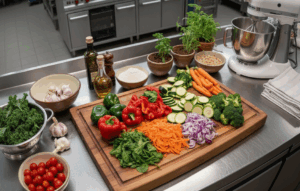Grab your passport! This year we’re going on a delicious, international flavor fest. As we enter 2024, the culinary world is ablaze with exciting trends that promise to tantalize taste buds and offer a truly international dining experience. Gordon Food Service® Corporate Executive Chef Kurt Kwiatkowski said this new year’s culinary landscape is all about the fusion of traditional techniques with international flavors sprinkled in everything from beverages to barbecue.
Traditional Barbeque Goes Global
Traditional barbecue is getting a makeover in 2024. Kwiatkowski said the slow-cooked barbecue is taking center stage. The use of wood, oak and charcoal, along with a low and slow cooking technique, is combined with international world flavors. Barbecue enthusiasts are in for a treat as dishes are infused with a delightful array of global spices and ingredients.
“Asian flavors in barbecue are definitely going to be big, but I’m also seeing Indian flavors like cardamom, ginger, cinnamon and coriander – all those beautiful flavors,” he said.
He also anticipates seeing more dishes like lamb leg flavored with North African seasoning that creates “beautiful coloring.” The lamb is then turned into barbecue, cooked over indirect heat.
“I think people are trying new things, and if they are trying something new, it has to be something special. Some trending barbecue dishes are about telling peoples’ stories,” he says.
For example, a Japanese restaurant in Texas mainly did barbecue using a smoker on the menu. But what made it reflective of Japanese heritage was the miso barbecue sauce all over it, Kwiatkowski recalls.
Asian Flavors Will Continue to Shine
Also expected to be big are Asian flavors but in new and exciting forms. It’s time to replace the usual sriracha and gochujang flavors with bigger and bolder flavors, Kwiatkowski said.
From traditional Japanese barbecue to exploring Korean cuisine beyond the usual classics, there’s an emphasis on delving deeper into the diverse and tasty world of Asian gastronomy.
“You’re going beyond gochujang and pork-neck soup and different dishes you don’t usually see. I think that’s the attraction,” he said. “You’re digging deeper into the Korean ingredients.”
Speciality Food Association backs that up, noting that Calabrian chili peppers appear in conventional and slightly unconventional products: pasta sauce, hot sauce, cured meats, snacks, relish and hot honey.
Michael Viloria, a Gordon Food Service culinary specialist, said many Asian dishes are adding some heat – and that’s what’s driving its popularity. Even some mainstream Chinese dishes will have more of a Korean flare– like chicken lettuce wraps, for example.
“The global flavors create unique flavor combinations that are familiar but different. From very savory – like umami, salty and sweet to sweet and sour – many of those combinations add a little heat to the palette,” he said.
The Rise of Indian Cuisine
Indian cuisine is experiencing a comeback but with a twist in 2024. It’s all about chaos cooking with a fast-casual feel and, on the flip side, elevated Indian food in fine-dining spaces, Kwiatkowski said.
The days of limiting Indian cuisine to naan and tikka masala are long gone, he says.
South Indian street food and seafood doused in many interesting spices will soon be popping up on menus, he said. The good news for restaurant operators is that they don’t have to overhaul their entire menu to add some new, trending flavors into their establishments.
It’s just about incorporating the flavors and knowledge of Indian cuisine to create innovative and enticing dishes.
“There’s so much more than naan and tikka masala. When you go to South India, there is a lot of seafood and street food everywhere. Maybe you own a bar and you throw a little tikka masala on a pizza. Put it out there and see what people say,” he suggests.
Curiosity Meets Innovation
Ed Werner, a Gordon Food Service culinary specialist, underscores that curiosity is what is driving the global flavors trend. People are eager to try new flavors that hit all the right taste notes, keeping them returning for more. With many global flavors growing in popularity, they will be integrated into cuisine not traditionally found in various regions.
Take Tahini, for example. It’s traditionally associated with Middle Eastern cuisine but is becoming increasingly mainstream, Werner says. It’s being paired with a wide range of foods and beverages, such as milkshakes, cookies and pastries.
“These global flavors tend to be well-received because they awaken the taste buds and keep people wanting to try more.
“I would say to all operators: Try finding a place for new global flavors on your menu. You can swap out a wing sauce or try a global street food in your handheld section. People want something new, and those flavor combos are great.”











